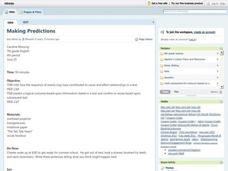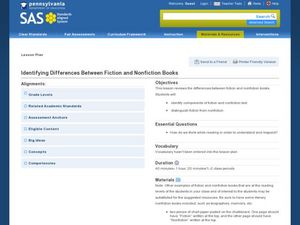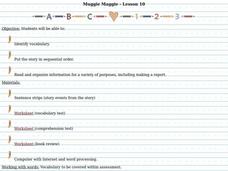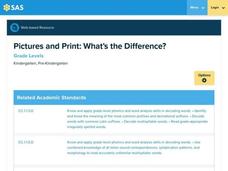PBS
Copyright and Fair Use
When is using someone else's copyrighted material appropriate? Learn about copyright and fair use with a lesson from PBS.org. Scholars read through a reference sheet about authors' rights and users' rights, and then create posters...
Curated OER
Going West
Students examine the lives of early pioneers who traveled west for better opportunities. They listen to story "Josafina and the Story Quilt", and discuss hardships encountered by traveling families. Students then complete research and...
Curated OER
Animal: Unique Creatures With Great Features
Students present models, oral reports, and presentations on animal's characteristics. They research various animals and the characteristics that link them to specific animal groups. They answer specific questions relating to animals in...
Curated OER
Making Predictions
Seventh graders read stories, stopping periodically to make predictions. They discuss how the sequence of events, as well as cause and effect, can give hints to the outcome of the story. In addition, 7th graders use logic and...
Curated OER
All About Me
Students explore autobiographical stories. They write about a personal experience that is significant and memorable. Students specifically explain the chosen events. They define autobiography and share their stories.
Curated OER
Harriet The Spy
Fourth graders investigate the style of diary writing as its own genre of literature. They read Harriet The Spy in order to have a text for this literature study. Students use the skill of prediction to preview the story, and then...
Curated OER
Narrative Prompt - Lesson 2
Second graders review the structure of a narrative piece of writing. Individually, they write a narrative based on their best day of school. After being read different stories, they share their own narratives with the class. They are...
Curated OER
Character Education-Honesty
First graders learn the importance of honesty as they practice problem solving, listening, and sequencing skills. The lesson uses the story, " Too Many Tamales."
Curated OER
Identifying Differences Between Fiction and Nonfiction Books
Students explore the differences between fiction and non-fiction book. For this genre study lesson, students read examples of fiction and non-fiction and identify the characteristics of each genre. Students list the characteristics on a...
Curated OER
Butterfly Life Cycle
Students read books about animals and describe their structures, how they grow and change, and their life cycles. In this animals lesson plan, students also make animals out of pasta.
Curated OER
Then What Happened?
Students complete activities about the story "Diary of a Worm", by Doreen Cronin. In this reading comprehension lesson, students make predictions and apply prior knowledge about the topic of the story. They actively listen as the book is...
Curated OER
Inferring Themes
Fifth graders practice making inferences on various types of reading material. As a class, they develop a definition of the word "theme" and discuss themes for some of their favorite stories. They use the context of the reading...
Curated OER
How Worldly Are You?
Sixth graders locate and map six components to have a working knowledge of maps. In this map skills lesson, 6th graders define the six map components and work in groups to draw a map using the components. Students read a related...
Curated OER
Narrative Literature Response Letters
Third graders write endings to a story that has already been written. They offer alternative endings in their version. The lesson includes a rubric that is to be given to the students in order that they know the requirements.
Curated OER
Muggie Maggie
Students practice story telling by placing story elements in order to make sense to a reader. In this reading comprehension lesson, students practice using vocabulary words from the story Muggie Maggie, as well as reviewing...
Curated OER
Identify and Analyze Literary Concepts
Young scholars explore plot structure, conflict, setting, and mood. In this literary elements lesson, students read Rosa Parks, My Story and complete the provided plot outline worksheets. Young scholars discuss the text elements of...
Curated OER
A Taste of Blackberries
Fourth graders participate in a shared reading of Doris Buchanan's, A Taste of Blackberries. They read about grief in the loss of a best friend and examine the skills of a responsible family member.
Curated OER
Extremely Personal Narrative
Seventh graders practice the skill of writing a personal narrative. They bring in an object that is related to themselves. Then students discuss the importance of the items and then write a personal narrative about the objects. As an...
Curated OER
Charlie and the Chocolate Factory
Fourth graders research and write an author report on Roald Dahl, including books written by him, birthplace, family life, and other information on his writing. Students read aloud chapters in the book. Students create a newspaper...
Curated OER
Crazy Critters Creative Writing
Young scholars brainstorm animals with unusual characteristics such as a giraffe with a short neck or a zebra without stripes. They write paragraphs about their animals and work in peer editing groups to refine their stories.
Curated OER
What Was it like to Live During the Depression?
Fourth graders research a variety of sources to discover information about how the depression effect people in Michigan. They follow a research outline while working in small groups. They design a presentation that describes live during...
Curated OER
Catch Me If You Can: Over and Under
Students read a story. In this vocabulary skills lesson plan, students read The Gingerbread Man, use flannel cut outs to re-enact the gingerbread man running over and under.
Pennsylvania Department of Education
Pictures and Print: What's the Difference?
Students watch a PowerPoint presentation. In this early literacy lesson, students watch a PowerPoint presentation describing print from pictures and the difference between the two.
Curated OER
Why Thank You!
Fifth graders listen to a read aloud of Patricia Polacco's, Thank You, Mr. Falker! students examine the use of voice in the book, discuss the writing and theme ideas. They write a thank you not to their hero.























